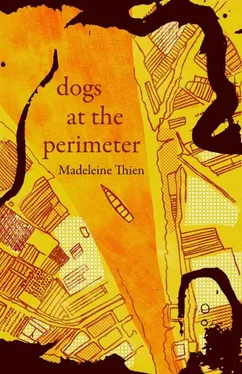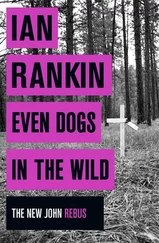He remembers the days they went to the discotheque, Dararith bought the beer but they gambled with James’s cash. Dararith steered the moped that ferried them around but usually James and Sorya had to walk home without him, picking their way through the rubble. Dararith, he pursued women as if they were keys on a ring, and he was always falling in love because his brand of affection was endearingly sudden. Sorya was glamorous with her black hair loose and her bare shoulders and calf-high boots, her market-stall clothing that she wore like high fashion. She carried herself like a girl who’d been to Paris, to New York, but it was all show. Television, she told him, on one of those awkward walks home, can be a gifted teacher. And books. She married James, maybe, for his books. Something to distract her while she waited for her brother to come back, but it’s been two years and it’s obvious by now that people don’t come back.
She doesn’t wear makeup anymore but her hair is still long. Unbrushed, it floods around her and it seems, to James, as if it eats the light and hides the things that no one says: I married you as a favour to Dararith, I married you because of the war, out of loneliness, out of fear. I love only you. They both think these things, they both hold themselves in reserve.
“James,” she says now. “It’s a good name but it doesn’t suit you.”
“King James.”
She pushes the covers aside, stands up. When did she get so thin, so melancholy?
“Don’t leave me,” he tells her but then he is suddenly embarrassed.
“I hate sleeping alone,” he explains and she turns, a half-smile on her face, a half-sadness.
The war was ending and he worked all the time. The storehouses were empty, he had no medicine, no needles, saline, or chloroquine, no bandages, no aspirin or dysentery pills. He patted shoulders, amputated limbs, blinked into the persistent heat, and turned his back on the worst cases. It was the cool season, supposedly, but his clothes were sweat-drenched by ten in the morning. In his gut was a feeling of panic mixed with the weight of inertia, he was light-headed and joyous and bitterly angry. The radio spewed bulletins from the war in Vietnam and the shaming of the Americans not only there but here in Cambodia and next door in Laos. Ask the diplomats — American, French, English — and this humiliation was everyone’s fault but their own. Ask the Cambodians what would happen next and they just shrugged and smiled their fatalistic smiles. James hoped it was the last time he would live in a place where no one carried any responsibility, where the days were predetermined by the hundred lives already lived, by a thousand acts of karma, by destiny that rubbed out other destinations. He was sick of this country and he would have left already if it weren’t for Sorya, that’s what he tells himself. But every day he goes back to the camps and the Red Cross shelters and feels strangely at peace. Ten years ago, he was smoking pot in a dive on Powell Street, coming home blinkered, but his mother and Hiroji, true innocents, never noticed a thing. When he gets high it reminds him of how the air burned his throat in Tokyo when he was small, how he was terrified of fire, and then the long journey by boat and plane and bus that took them to Vancouver where everything was green, where things were young and not skeletal, but still he was so fucking scared. Japan was finished, his father said, even the ground was poisoned but now, Now we go from fire to water, from the city to the sea . He had turned the words into a song, a nursery rhyme. His father had been a professor of medicine at Tokyo University, he had been a solemn, determined man, but the supreme effort of getting them out of post-war Japan had ruined his health. When his contacts in America disappointed him, he had turned to England. In the end, he settled for Canada. A year after they reached Vancouver, his father died, post-stroke, on a crisp, white bed in a Canadian hospital. James remembered the place well, the sharp, stingy smell of it and the squawk of rubber soles on the icy floors. Be brave, his father had told him, and all the while his kid brother had pressed his pink face against his mother’s skin and slept in ignorant bliss.
His mother had opened a dry goods shop on Powell Street and James had taken his first paper route, his first of many: The Vancouver Sun , the Province , the Sing Tao Daily. Hiroji used to lie on the mat in the back of the store and coo at them, and the baby’s cooing made James feel improbably wise. He was eleven years old when he told his baby brother that they would both be doctors, real professionals. Maybe Tokyo and his father had given him a taste for calamity, maybe he had inherited his father’s uneasy, chafing mind. He scraped through medical school, finished his residency. The Vietnam War was in full swing and he signed up with the Red Cross. When all hell broke loose, he preferred to be busy and not just standing around. Saigon was fine, but Cambodia is something else, manic depressive, split with contradictions. They take him for local here, a regular Chinese-Khmer slogging through the mud.
On the night he travelled from Phnom Penh to Neak Luong, he packed and unpacked three times, removing his camera, adding his journal. Removing bandages and adding chocolate and whiskey. Overhead, helicopters circled and he told Sorya, “Maybe it’s better if you come with me.”
“I don’t think so,” she said.
He was on his way east and he realized she was right. Any day now, Neak Luong would fall to the Khmer Rouge. Probably he’d be shot by a sniper, or his boat would be shelled, or some hideous Communist maquis would poach him and serve him for supper.
“Write me a letter,” she said and they smiled because the postal system was a joke.
“Take this money,” James said, “and buy us two tickets for Bangkok.”
“Honestly, you want to leave Phnom Penh? This heaven.”
“Do you?”
She laughed. “All this time, I only stayed because of you.”
“Don’t joke,” he said, confused.
“Careful in the wild,” she said. “Don’t come home dressed in black, carrying an ak, and wearing rubber sandals. I’ll shoot you on sight.”
“I’ll come in a stampede of elephants.”
Her eyes teased him with restrained laughter. The foolish things he would do, the foolish dances he would perform, to make her laugh.
“In better days,” he said, “we’ll go to the sea.”
“Promise me.”
He saw the lines at the corners of her eyes, he heard something in her voice, a foreboding, a hopelessness he’d tried so hard to banish with bravado, with laughter. What other avenue was left them? Every day they were surrounded by corpses, women without faces, men without limbs.
“Yes,” he said. “I do promise.”
—
They were ambushed in the dark. The cruddy boat tipped right then left, and James had a crushing sense of déjà vu as black-clothed creatures lifted from the water and slithered into the boat. He wondered whether Sorya would open the cache of money he had left her, whether any tickets remained for Bangkok, whether she would stay or go. For a split second, before the first kick, he thought he was being sent to join Dararith in the afterlife to which all doctors disappeared: a haven of arrogant, self-pitying men, a fate worse than hell. But this wasn’t a joke. These creatures had no sense of irony. They beat him and he, a soft Canadian, was already begging for mercy after the first punch. So this is what blood tastes like, he thought. So this is what real suffering is. They threw him into a hold. He thought of his father, who’d had the good sense to pass away in a clean bed rather than down in the reeking underground, in the terrifying Tokyo shelters, and now he, King James, would pass away in the dark, sucked into the careless water. One day he would wash up, bloated and unrecognizable, onto the shore of a shitty country. He heard them shoot the boat driver. He cried harder as they threw the body away.
Читать дальше












